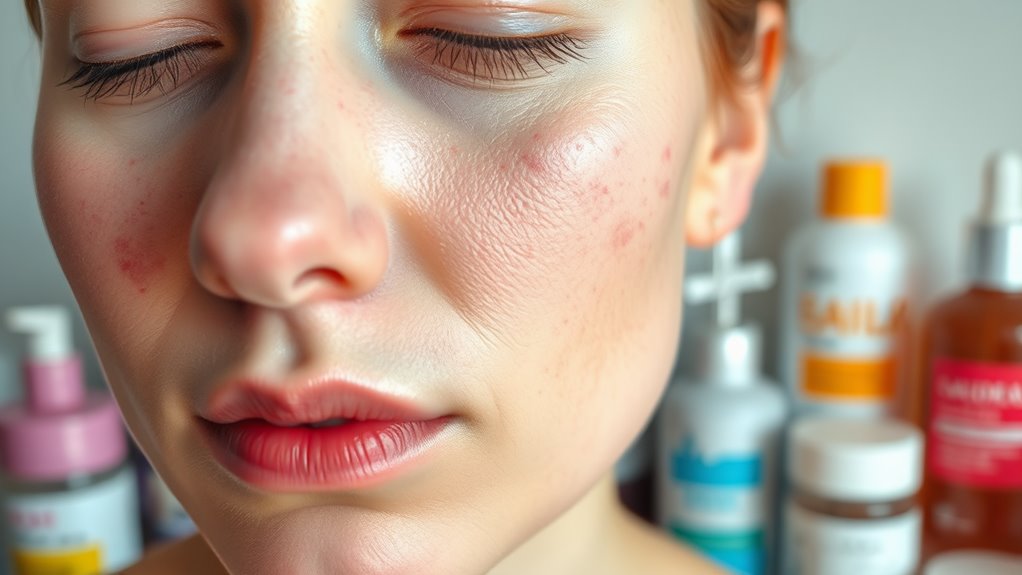The #1 Mistake People With Sensitive Skin Always Make
Did you know that nearly 70% of individuals with sensitive skin skip patch testing new products? This common mistake can lead to irritation and long-term damage, as you may unknowingly expose your skin to allergens. Understanding the right approach is crucial for maintaining your skin’s health. Are you making this critical error in your skincare routine? Discover how simple changes can make a significant difference.
Key Takeaways
- Skipping patch testing before using new products can lead to adverse reactions and irritation on sensitive skin.
- Over-exfoliating or using harsh products strips natural oils, worsening sensitivity and discomfort.
- Ignoring skin signals like redness or itching can result in further complications and long-term damage.
- Opting for products with fragrances or harsh chemicals increases the risk of allergic reactions.
- Frequently changing skincare products prevents the skin from adapting, leading to increased irritation and sensitivity.
Understanding Sensitive Skin
What makes skin sensitive? Various factors contribute, including genetics, environmental conditions, and skincare products.
If you’ve got sensitive skin, you might be prone to irritation, redness, and discomfort.
A common sensitive skin mistake is over-exfoliating or using harsh products, thinking they’ll help. Instead, they often strip natural oils, exacerbating sensitivity.
You should also consider your diet; certain foods can trigger reactions. Stress plays a role too, as it can weaken your skin’s barrier function.
Understanding these elements is crucial for managing sensitive skin and preventing further irritation. Prioritize gentle care, and you’ll see significant improvements. Additionally, many individuals overlook the importance of using gentle products, which can significantly reduce the risk of irritation.
The Importance of Patch Testing
When managing sensitive skin, patch testing new products can save you from potential reactions and irritation. This simple step involves applying a small amount of the product to a discreet area, like your wrist or behind your ear. Wait 24 to 48 hours to observe any adverse reactions. By doing this, you can identify irritants before they cause widespread discomfort. Remember, even products labeled “hypoallergenic” can trigger sensitivity. Consistent patch testing allows you to build a personalized skincare routine, ensuring that you only use products that work harmoniously with your skin. Additionally, incorporating a simple skincare routine can enhance your skin’s resilience and overall health. Prioritize this practice to maintain your skin’s health and comfort.
Choosing the Right Products
How do you choose the right products for your sensitive skin?
Start by opting for fragrance-free and hypoallergenic options. Look for gentle cleansers and moisturizers specifically labeled for sensitive skin.
Avoid products with harsh chemicals or alcohol, as they can exacerbate irritation. It’s wise to select non-comedogenic items if you’re prone to breakouts.
When trying a new product, always perform a patch test to gauge your skin’s reaction. Stick to minimal ingredients; simpler formulations often yield better results. Additionally, be aware that fragrance ingredients can sometimes lead to skin irritation, so it’s best to prioritize products without them.
Lastly, don’t hesitate to consult a dermatologist for personalized recommendations tailored to your unique skin needs. Your skin deserves the best care.
Overlooking Ingredients
When it comes to sensitive skin, ignoring ingredient labels can lead to irritation and discomfort. You must pay attention to common irritating ingredients and understand the differences between natural and synthetic components. Additionally, being aware of ingredient conflict can help you select products that work harmoniously together.
Common Irritating Ingredients
Have you ever considered that some common ingredients in your skincare products might be the culprits behind your sensitive skin issues?
Many individuals overlook irritants like alcohol, fragrances, and parabens.
Alcohol can strip your skin’s natural moisture, leading to dryness and irritation.
Fragrances, whether synthetic or natural, often provoke allergic reactions.
Parabens, used as preservatives, have been linked to skin sensitivity in some people.
Additionally, sulfates can cause dryness and irritation, especially for those with sensitive skin.
Importance of Reading Labels
Understanding the role of irritants like alcohol and fragrances in your skincare routine makes it imperative to read product labels carefully. Many products may contain hidden irritants that can exacerbate your sensitive skin issues.
Always check the ingredient list, focusing on the first few items, as they represent the bulk of the formulation. If you spot any potentially harmful ingredients, don’t hesitate to put the product back on the shelf.
Prioritizing your skin’s health means being vigilant about what you apply. By reading labels, you empower yourself to make informed choices, ensuring your skincare enhances rather than harms your complexion.
Natural vs. Synthetic Components
Choosing between natural and synthetic components in skincare can significantly impact sensitive skin. Many assume natural ingredients are always safer, but that’s not always the case. Some natural substances can irritate just as much as synthetic ones. It’s essential to evaluate the specific ingredients in your products.
| Ingredient Type | Potential Benefits | Possible Irritants |
|---|---|---|
| Natural | Gentle, nourishing | Essential oils |
| Synthetic | Stable, controlled | Preservatives |
| Both | Targeted solutions | Fragrances |
Always research and test products to ensure they suit your unique skin needs.
Skipping Sun Protection
Many people with sensitive skin underestimate the importance of daily sun protection. Choosing the right SPF is crucial, as it can make a significant difference in preventing irritation and long-term damage. Don’t fall for common misconceptions about sunscreen; your skin deserves better. Consistently using sunscreen can help maintain youthful, radiant skin as it protects against harmful UV rays that contribute to premature aging.
Importance of Daily Protection
How often do you think about the impact of sun exposure on your sensitive skin? Daily protection isn’t just a suggestion; it’s essential.
The sun’s UV rays can exacerbate redness, irritation, and long-term damage, making your sensitive skin even more vulnerable.
You might think you only need protection during summer, but harmful rays can affect you year-round.
Incorporating a broad-spectrum sunscreen into your daily routine safeguards your skin from both UVA and UVB rays.
Remember, neglecting this crucial step can lead to premature aging and increased sensitivity.
Prioritize sun protection daily to maintain healthy, resilient skin.
Choosing the Right SPF
Finding the right SPF can make all the difference for sensitive skin.
You need a broad-spectrum sunscreen with at least SPF 30 to effectively protect against UVA and UVB rays.
Look for mineral-based options containing zinc oxide or titanium dioxide, as these are less irritating.
Always test a small patch before applying it to your face or body to avoid reactions.
Don’t forget to reapply every two hours, especially if you’re sweating or swimming.
Skipping sun protection can lead to irritation, redness, and long-term skin damage.
Prioritize your skin’s health by choosing the right SPF daily.
Common Misconceptions About Sunscreen
Why do so many people underestimate the importance of sunscreen?
One common misconception is that sunscreen isn’t necessary on cloudy days or during winter. UV rays penetrate clouds and can harm your skin year-round.
Another myth is that darker skin doesn’t need protection. Everyone, regardless of skin tone, can suffer from sun damage.
Additionally, some think that makeup with SPF is enough, but you need a sufficient amount for real protection.
Finally, it’s a mistake to skip sunscreen indoors; UV rays can still reach you through windows.
Consistent application is crucial for maintaining healthy, sensitive skin. Don’t take chances—always protect yourself.
Ignoring Skin’s Response
Ignoring your skin’s response can lead to a cascade of problems, especially if you have sensitive skin. Many people overlook signs of irritation, dryness, or breakouts, dismissing them as temporary. However, your skin’s reactions are crucial indicators of what works for you.
| Skin Response | Potential Cause |
|---|---|
| Redness | Allergic reaction |
| Dryness | Harsh ingredients |
| Breakouts | Clogged pores |
| Itching | Irritation or allergy |
Pay attention to these signals. Addressing them promptly can prevent further complications and help you achieve healthier skin. Additionally, common skincare mistakes can exacerbate these issues, making it essential to be mindful of your routine.
Establishing a Consistent Routine
Establishing a consistent skincare routine is vital for maintaining balance, especially for sensitive skin. By using the same products daily, you allow your skin to adapt and react positively.
Start with a gentle cleanser, followed by a soothing moisturizer tailored for sensitive skin. Incorporate a broad-spectrum sunscreen every morning to protect against UV damage.
Avoid frequent product changes; instead, give your skin time to adjust. If irritation occurs, assess your routine and simplify if necessary. Additionally, avoiding morning skincare mistakes is essential to ensure the best results from your routine.

